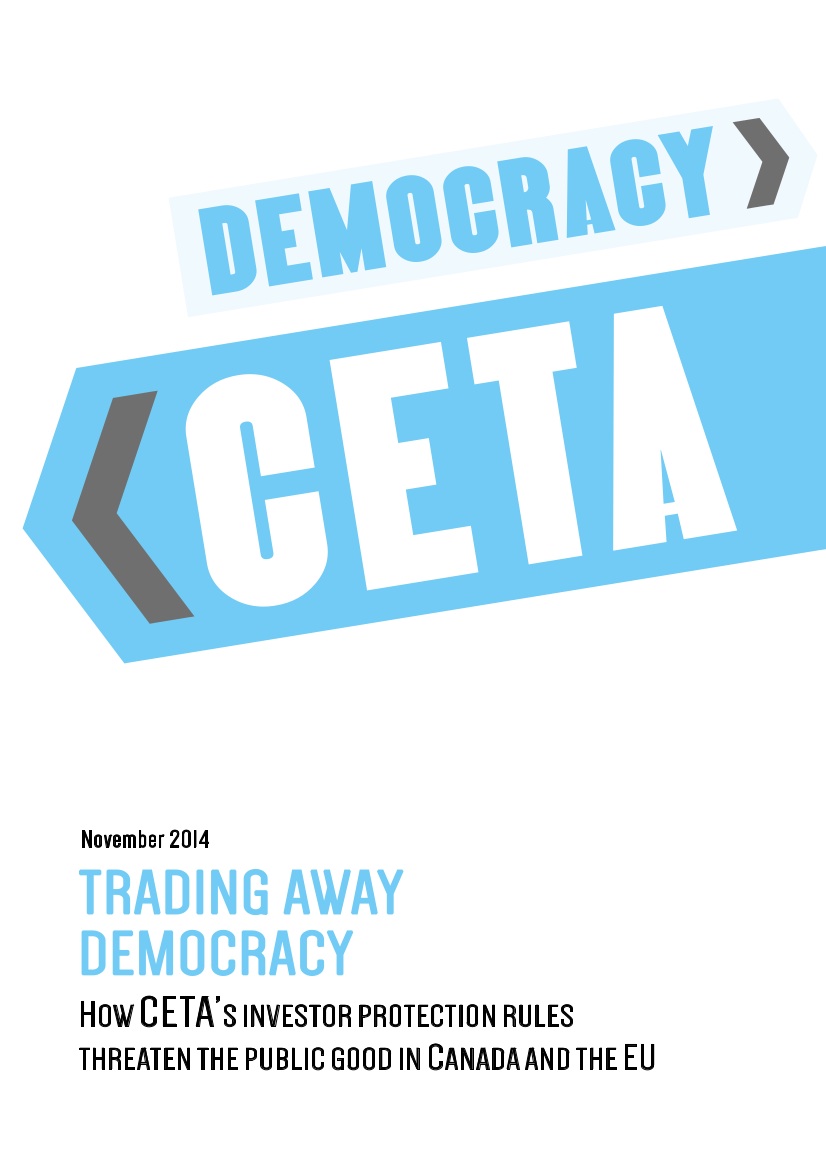The Council of Canadians and more than a dozen European and Canadian organizations simultaneously released a new report that looks at the threat posed by the controversial investor protection rules in the proposed Canada-EU Comprehensive Economic and Trade Agreement (CETA).
The report, Trading Away Democracy: How CETA’s investment protection rules threaten the public good in Canada and the EU, warns that expansive new protections in the agreement’s investment chapter — including the investor-state dispute settlement (ISDS) mechanism similar to NAFTA’s Chapter 11 — could “unleash a corporate litigation boom against Canada, the EU and individual EU member states, and could dangerously thwart government efforts to protect citizens and the environment.”
While CETA’s proponents argue that negotiators have introduced a number of so-called reforms to ISDS, which allows corporations to directly sue countries for policies or measures that interfere with their “legitimate expectations” of profit, the report finds that CETA “would arguably grant even greater rights to foreign investors than NAFTA” and that future government policy will be constrained if CETA is ratified.
For Canada, the report points to new risks posed by CETA’s expansive new corporate rights in the financial sector, which go far beyond NAFTA’s existing disciplines in the banking and insurance industries. “The risks for Canada of being sued by banks, insurers and holding companies will increase significantly with CETA. These risks are evident as speculative investors, backed by investment lawyers, are increasingly using investment arbitration to scavenge for profits by suing governments in financial crises. Also, most investment is coming to Canada from exactly those EU countries where investors are notorious claimants in investor-state disputes: the Netherlands and the UK.”
The report also warns that European investors — which are the second largest source of foreign direct investment (FDI) in Canada, with $180.9 billion in investments in 2012 accounting for a quarter of all FDI into Canada — are the most frequent users of ISDS globally. Of the 568 known cases of investor-state challenges, European-based investors have launched 299 of them, or over half of all investor-state challenges. US investors, which have already cost Canadian taxpayers over C$170 million in NAFTA challenges to date and are currently seeking billions more, account for an additional 127 of the know ISDS cases.
In other words, if CETA is ratified Canada will have expansive investor protection rights agreements with countries that account for three-quarters of all challenges, putting public interest policy at risk from the federal to the municipal level.
Trading Away Democracy warns that the European Union is also taking a major risk with CETA’s investment protection rules. It found that EU regulations in the mining and oil and gas sectors — where Canadian investment in Europe is significant — are at particular risk of challenge by Canadian-based mining corporations. More than one in three known ISDS cases worldwide are already related to mining, oil and gas projects. Canadian mining companies, which have earned a global reputation as “far and away the worst offenders in environmental, human rights and other abuses around the world” are already engaged in a number of controversial projects in the EU which are facing still opposition from local residents and environmentalists.
CETA will also act as a Trojan Horse in Europe for U.S. multinational corporations with subsidiaries in Canada, which will be able to use their “substantial business interests” to launch challenges against EU regulations. This is of particular concern for Europeans given the high level of foreign ownership in the Canadian economy, where almost 40 per cent of all large enterprises are foreign owned. Almost 60 per cent of annual foreign investment in Canada from 1985 to 2014 was from the US.
CETA would also allow Canadian corporations with a presence in Europe, such as Bombardier, and European corporations with Canadian arms, including Shell and BP, to sue their own governments over measures that interfere with their profits.
Increasing opposition to ISDS, most notably in Europe, has been met by the Canadian government and European Commission with a misleading propaganda drive focused on the cosmetic reforms that CETA has made to investment protections in the proposed agreement. With the September 26 release of the final agreement being presented to citizens of both sides of the Atlantic as a fait accompli (subject to minor “adjustments” during the legal review which is expected to take most of 2015 to complete), the report concludes by calling on legislators in Canada, the EU and European member states to reject any CETA text which includes investor-state arbitration.
Download the full report or the executive summary.



